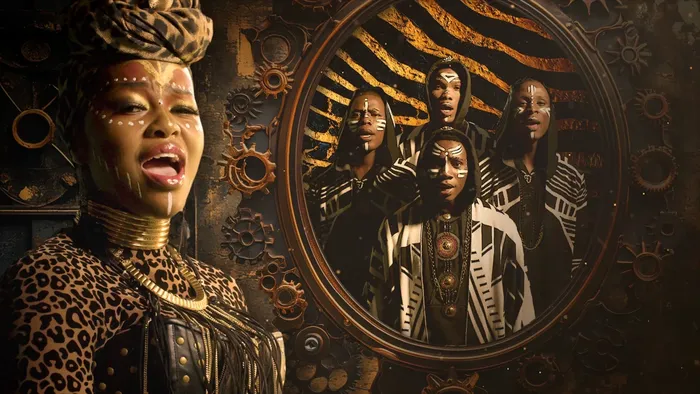WATCH: Queen’s ‘Bohemian Rhapsody’ reimagined in isiZulu by Ndlovu Youth Choir will give you chills

The Ndlovu Youth Choir has captured local and global attention with their isiZulu rendition of Queen’s Bohemian Rhapsody.
Image: YouTube
The Ndlovu Youth Choir has once again drawn the attention of South Africans and international audiences with their latest project, an isiZulu rendition of Queen’s classic song “Bohemian Rhapsody”.
The choir’s interpretation has been released on YouTube, where it has already attracted close to 300 000 views, showing the reach and impact of their work.
The video presents the choir dressed in traditional attire, bringing a distinctly African identity to one of the most recognised songs in rock music history.
Their interpretation combines isiZulu translation of the lyrics with harmonies influenced by isicathamiya, a choral style with deep roots in southern Africa.
While the song retains its dramatic structure and rhythm, the language and performance reframe it within an African context, which also resonates with the origins of Freddie Mercury, Queen’s lead singer, who was born in Zanzibar before moving to England at the age of 17.
Social media reactions have reflected the emotional response to the performance.
One YouTube user wrote: “THIS is the kind of performance I want to see at the Grammys.”
Another comment read: “As a long-time Queen fan, this is the most moving cover of this song I have ever heard. The Zulu version brought me to tears. Freddie Mercury would be proud.”
Others noted the connection between Mercury’s African roots and the significance of an isiZulu version, with one fan commenting: “Being that Freddie was born in Tanzania, it feels right that an African choir has honoured this masterpiece.”
Queen’s “Bohemian Rhapsody" is considered one of the most ambitious rock songs ever written.
Its origins date back to the late 1960s when Mercury was a student at Ealing Art College in London. At that time, Mercury had begun sketching ideas for a song, writing fragments on scraps of paper.
These fragments developed into a six-minute track that combined elements of ballad, opera and hard rock.
When the song was released in 1975 as part of Queen’s album “A Night at the Opera”, it defied conventions of popular music.
At a time when most singles were expected to run for no longer than three minutes, “Bohemian Rhapsody” stretched to six minutes without a chorus, shifting between musical styles in an almost theatrical way.
Despite initial doubts from record executives, the song went on to reach number one on the UK Singles Chart, where it remained for nine weeks, and has since become one of the most-streamed and performed songs in history.
The song’s lyrics have long invited speculation. Mercury never explained their meaning, though lines such as “Mama, just killed a man, put a gun against his head, pulled my trigger, now he’s dead” and “I see a little silhouetto of a man” have been interpreted by some as reflections of his private life and struggles with identity at a time when open discussions of sexuality were rare in mainstream music.
The ambiguity of the words has allowed the song to carry multiple interpretations while maintaining its emotional power.
The Ndlovu Youth Choir’s rendition of “Bohemian Rhapsody" is notable not only for its artistic impact but also for the permissions behind it.
It is the first officially licensed version of the song to be performed in isiZulu, authorised by Queen’s Brian May, Roger Taylor and the Mercury Phoenix Trust, an organisation founded in Mercury’s memory to fight HIV and AIDS worldwide.
Securing the rights was a long process for the choir. According to Ralf Schmitt, the choir’s musical director, translating a song of this complexity required careful work.
“Translating lyrics can be tricky, and it is easy for the message of a song to be lost along the way,” he told "The Times". To ensure accuracy and resonance, the choir worked with Sipho Sithole, an academic specialising in isiZulu and African languages.
Together they produced a version that retained the essence of Mercury’s original while adapting the phrasing and rhythm to fit isiZulu’s structure.
This approach ensured that the translation was both faithful and singable, allowing the choir to perform the piece with the same dramatic intensity as the original while grounding it in African linguistic and musical traditions.
The Ndlovu Youth Choir was founded in Limpopo, as part of the Ndlovu Care Group, an organisation focused on community development and healthcare. Initially created to give young people a safe and creative space, the choir soon developed into a professional group with international recognition.
In 2019, they competed in "America’s Got Talent", where they reached the finals and won global praise for their performances that combined African choral traditions with contemporary pop and classical influences.
The choir is known not only for its musical ability but also for its role in community development. Many members come from backgrounds where opportunities are limited, and the choir provides education, training and a pathway to professional performance.
Related Topics: